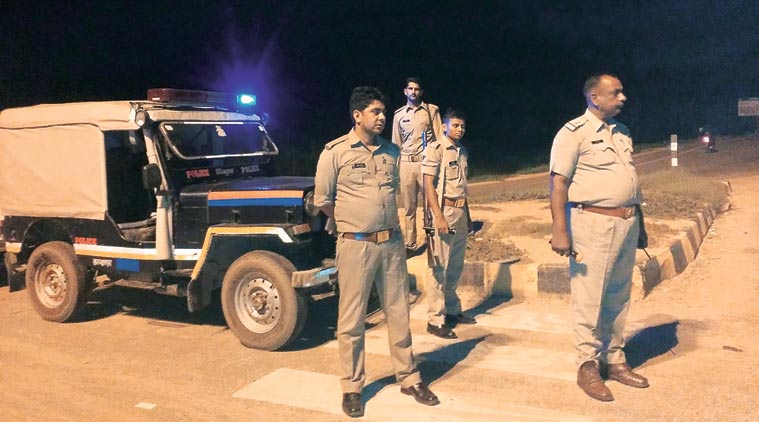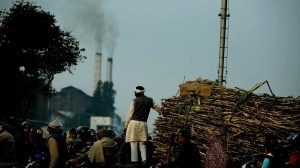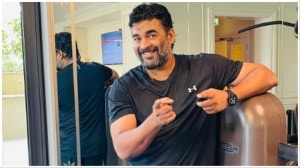- India
- International
Kotwali Dehat, NH-91: A night in the life of highway police patrol
Low on fuel, staff, toilets, electricity, money, even chairs, a patrol team of UP Police on Delhi-Kanpur highway, that saw the gangrape of a mother and daughter on July 29, can now afford no off time
 ASI Mahendra Singh and his team on NH-91. “Don’t tarnish this as a rape highway,” says Singh. (Express Photo by Ishita Mishra)
ASI Mahendra Singh and his team on NH-91. “Don’t tarnish this as a rape highway,” says Singh. (Express Photo by Ishita Mishra)
A visibly annoyed senior sub inspector (SSI) Bhawar Pal Singh scans the duty roster at the Kotwali Dehat police station in Uttar Pradesh’s Bulandshahr district. He has just got off a patrol jeep, part of a two-vehicle convoy that entered the compound a few minutes earlier.
While two constables and a home-guard from his detail head off in different directions — two to the mess and the third towards the toilet — Bhawar Singh makes his way to a table outside the SHO’s office where the roster is placed.
It’s 7.45 pm and another home-guard, seated on a chair outside the station lock-up, is popping some pills. “Bukhar hai ise. Iski lal ankhon se nahi dikhta aapko (He has fever. Can’t you tell from his red eyes)?” the SSI says.
Singh pulls out a whistle from his pocket and, as its shrillness resonates through the station compound, two ASIs, four constables and two home-guards rush towards him. Singh asks his men if they have eaten and if they’re carrying their weapons and flash-lights.
The police personnel here are under pressure; just last Friday, a woman and her 14-year-old daughter were dragged out of their car and gang-raped at a desolate stretch of National Highway-91, which falls under their jurisdiction. The crime site is just 4 km from the Kotwali Dehat police station.

The personnel here are aware of the scrutiny. “Mahendra Singh, you will go to the highway. The other team will patrol the villages. Move fast. It’s already 8.05 pm. The media is here. They will tag us lazy and corrupt,” Bhawar Singh says, before heading off to the mess.
A while later, a Mahindra jeep sputters to life and as it leaves behind a trail of thick black fumes, it takes ASI Mahendra Singh’s team towards the now infamous NH-91. On board though, the policemen show little urgency. The jeep moves at a steady pace while the men point their torches towards the dark fields.
At 8.30 pm, just as it is about to enter NH-91, the jeep comes to a stop under a huge street light at a T-point leading up to the highway.
Three of the policemen get off and disperse in different directions. “This is how we catch truckers who drink and drive,” explains Mahendra Singh, 59. “We can judge who is intoxicated by the way they turn their vehicles into the highway,” he adds.
Just then, Deepak Singh, a young constable from Muzaffarnagar district, shouts out, “Sir, let’s move to the left. A truck has been parked there for a long time; they must be drinking.” The four men climb back in and the jeep is started with the help of a pin, which has been fitted to a wire near the steering wheel.
There is an unmistakable stench in the vehicle, an unholy concoction perhaps of sweat, grime and leather, and Mahendra is apologetic. “This vehicle is on the road day and night. As one team leaves it, another picks it up. The government doesn’t even care. We get just 200 litres of petrol to run it for the whole month. How can one manage the maintenance, petrol and other expenses with this amount?” he says.
“Just 200 litres,” repeats Yashpal Singh, the trainee driver of constable rank who joined the department only a fortnight ago. “This jeep has run almost 1,600 km in the past 15 days. How will we manage for the rest of the month?” he says.
Some 600 metres later, the jeep stops beside the offending truck. The lorry driver is ordered out. Rajendra Kumar, the home-guard accompanying the patrol team, ventures near the driver. “He is drunk,” Rajendra declares soon after, patting the driver on the head.
The patrolling party proceeds to search the vehicle and finds several country-made liquor bottles inside. The confiscated bottles are destroyed beside a nearby bush. Once they realise that the occupants haven’t had much to drink themselves, the police personnel show some leniency and let them go.
Having dealt with the distraction, the team moves on. Around 9.15 pm, the jeep again comes to halt, this time at the ‘Thandi Payu’ police chowki. There is a police team at the spot. “All well?” asks Mahendra Singh as two constables rush to him with a broken chair. It’s a two-room outpost: one for the policemen to rest and the other to keep prisoners. There is no drinking water, and no toilet. Pointing towards the only bulb inside, Mahendra says, “We used to work in candlelight here. Later, we all pooled money and got an inverter. It’s better now.”
The ASI laments that despite being the only government body along with the Army to work 24X7, and even on national holidays, police have to fight for even bare necessities.
The rest of the group — seven constables, two ASIs and two home-guards — join in, talking about poor sanitary facilities, low salaries, lack of manpower, no electricity, even the lack of chairs.
It doesn’t stop there. They allege that police stations never get the money that is sanctioned for paying informers and for other odd jobs, and end up paying from their own pockets. They also point out that a junior policeman’s basic pay starts at a meagre Rs 5,200 a month, which may go up to Rs 15,000. “Is Rs 5,200 sufficient to sustain a family of three or four? When these petty expenses are added up, imagine the psychological pressure on police personnel. If we take help from people, like some petrol on rent or help in maintenance of our jeeps, you call us corrupt,” says Mahendra Singh, who, after having served the UP police for 27 years, is a year from his retirement.
“And you expect us to work efficiently in these conditions,” adds Deepak, saying that he can “give in writing” that if working hours are fixed for policemen, the force would not misbehave with anyone.
As the conversation flits between politics, education and even the spiritual, the men keep a keen eye on the surroundings, occasionally switching on and off their flash-lights. It is, however, interrupted at 9.45 pm, when an ambulance stops on the highway.
Watch Video: What’s making news
The men rush towards it. While there is no patient inside, the driver complains of stomach issues. He seeks help to contact his employer, Kailash Hospital, some 40 km from the spot, and claims his phone battery has run out. He is offered water and a constable’s phone. The person he contacts tells the ambulance driver to make it up to the next crossing, where his employers have arranged for a team to meet him. He leaves, thanking the policemen.
Mahendra Singh’s team then gets back on the jeep and heads towards the picket near Khurja, the last spot under the jurisdiction of Kotwali Dehat police in Bulandshahr. It is 10.15 pm when the party reaches and they have to stay till midnight.
“This is the place from where one can enter the villages here. So it is quite crucial,” says Deepak. “Sir, macchar bahut kaat rahe hain. Kal bukhar bhi aa gya tha (Sir, there are too many mosquitoes here. I even had fever yesterday),” complains Yashpal, the youngest of the lot.
Mahendra Singh takes out a small bottle, which contains a local mosquito repellant. ‘Baba Usmani Macchar Bhagao’, says the cover on the bottle and Mahendra tells Yashpal to apply it.
At the picket in Khurja, the discussion veers towards the incidents of last Friday. The men all proclaim that they haven’t seen or even heard of such a brutal crime on NH-91. “Lootings and robberies do happen but raping a 14-year-old in front of her father is horrible. We ask people not to stop their cars on the highway. Even if something hits you, drive until you reach a busy spot,” says Rajendra.
To the victim’s family’s claim that calls to the number 100 went unanswered, he says, “Police are always there, call again and again. It’s BSNL, there can be false rings.”
The incident, the team says, has dented an already short-staffed force. With nearly 10 of the 50 police personnel attached to the Kotwali police station suspended, the remaining 40 have been left to patrol the 142 villages under their jurisdiction. As a result, the men say, they have been working 24 hours a day since Saturday.
Mahendra insists that the Bulandshahr incident is a one-off. “Don’t tarnish this highway as a rape highway or a crime centre or use any other dramatic word. I would urge people to please come to NH-91 whenever they want. Feel safe and trust the police,” the ASI says.
Settling in for the remainder of his night duty that extends till 8 am, he adds, “Policemen have to deal with postings, promotions, transfers and chargesheets, depending on the whims of those in power. If a policeman is active and honest, he won’t work as per the orders of the politician in power, so they choose the corrupt ones.”
Along the highway, following the incident, the policemen are not taking a chance. It’s 1:30 am and 11 trucks, two buses and five cars have been stopped at a police picket near Wajeedpur road. “It’s not a checking drive,” say the police personnel manning the picket. “We are forming convoys to ensure the safety of these night commuters.”
Apr 25: Latest News
- 01
- 02
- 03
- 04
- 05







































